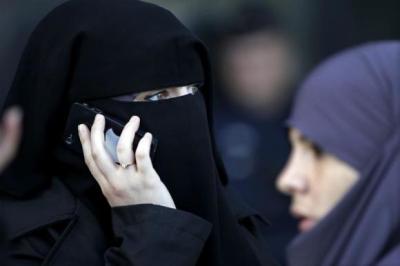European Court of Human Rights Upholds French Ban on Muslim Full-Face Veils

The European Court of Human Rights upheld on Tuesday a 2010 ban on full-face veils in France, ruling against a 24-year-old French woman who argued that the ban violates her freedom of religion and expression.
"While the Court was aware that the disputed ban mainly affected certain Muslim women, it nevertheless noted that there was no restriction on the freedom to wear in public any item of clothing which did not have the effect of concealing the face and that the ban was not expressly based on the religious connotation of the clothing in question but solely on the fact that it concealed the face," ECHR explained in its decision.
The devout Muslim woman, who wasn't named, petitioned that she wanted to be allowed to wear the burqa and niqab in accordance with her religious beliefs and personal convictions. She first took her case to the European Court in 2011, and has insisted that no family member has pressured her to wear the niqab.
French law bans people from wearing clothing that conceals the face, and places a penalty of $205 for doing so. The ban was introduced in 2010 under former conservative President Nicolas Sarkozy.
Dr. Grégor Puppinck, director general of the European Center for Law and Justice, told The Christian Post in an email on Tuesday that he considers the decision to be mainly political and not juridical.
"The Court could have legally arrived to the opposite solution. Indeed, if applied rigorously, the human rights standards on religious freedom would have led the Court to the condemnation of the French law. But the fact is that the burqua is not considered as a 'religious symbol' or clothing like other ones (because it isolates the women); this is why the Court did not apply the right to religious freedom," Puppinck told CP.
He added that ECHR judges consider Sharia Law, which calls on Muslim women to wear such clothing, to be incompatible with human rights.
"A condemnation of the French Republic would have simply not been accepted in France. As a matter of effectiveness of its decision and reputation, the Court could not afford to condemn the French "laïcité, (secularity)," the ECLJ director general noted.
France reportedly has close to five million Muslims, which is the largest Muslim minority in Western Europe, but only about 2,000 women are believed to wear full veils.
British attorney Ramby de Mello, had argued before the court in November that his client felt "like a prisoner in her own country," and called the full-faced veil "as much part of her identity as our DNA is of ours."
The court's ruling, however, took into account France's argument that the face plays "a significant role in social interaction" and so must not be concealed.
"The Court was also able to understand the view that individuals might not wish to see, in places open to all, practices or attitudes which would fundamentally call into question the possibility of open interpersonal relationships, which, by virtue of an established consensus, formed an indispensable element of community life within the society in question."
The ruling by the ECHR is final and cannot be appealed.




























